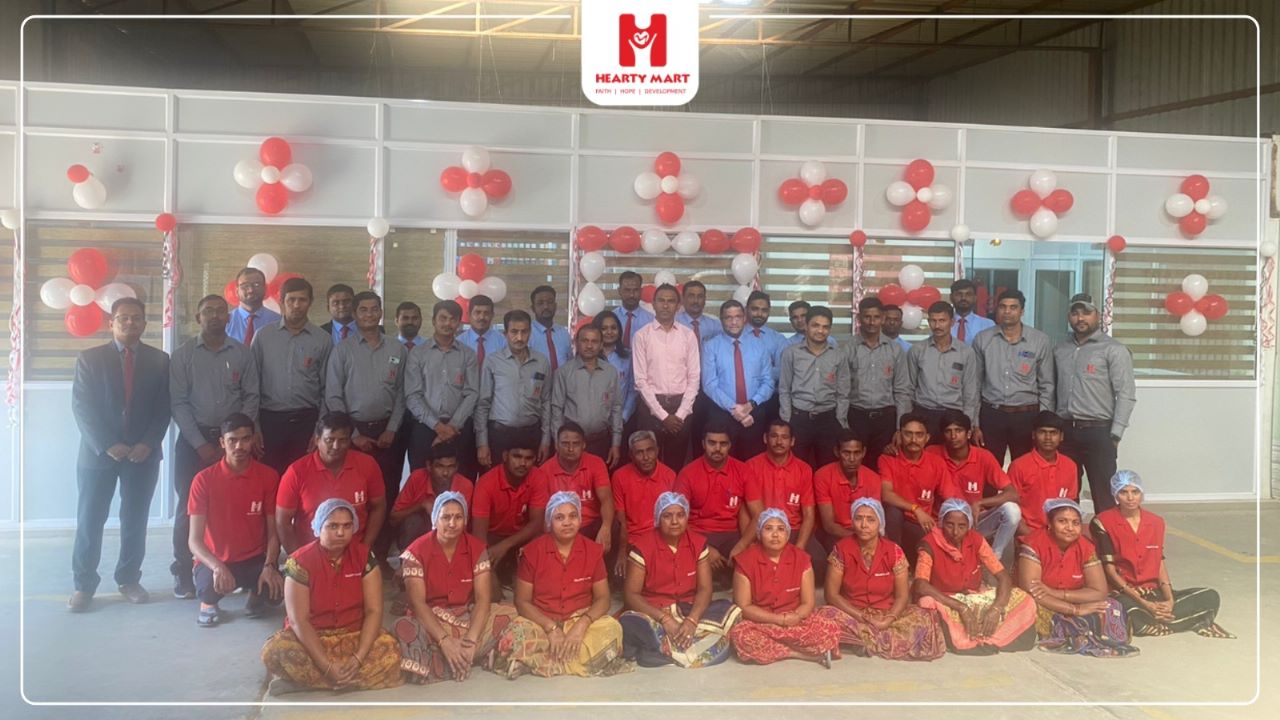Businesses are intrinsic to a healthy economy. Businesses generate immense opportunities for the people around, and financial value for the employees and the founders alike. A thriving business also fosters a lot of qualitative and social value; more so, from one actively seeking it. Such is the case of Hearty Mart – a company that has adopted the soul of Indian rural cohesiveness and propelled its employees and their village to new heights of success and prosperity.
Nested in central Gujarat, lies the unassuming village of Sathal. With its predominantly agrarian population, the village is home to numerous small-landholding farmers. Since income tends to be meagre for small landholders, a new norm has been established. The small landholders offer their lands for farming to the big landowners and take a fourth of the harvest as their share while engaging in more lucrative forms of engagement during the year.
Gujarat has long been known for its thriving entrepreneurial spirit, with individuals in both rural and urban areas finding innovative ways to generate extra income, and Sathal is no exception. Two farmers from the same family, Wazir Ali (Managing Director at Hearty Mart) and Hussain Abbas (CEO at Hearty Mart), decided to take a chance and enter the world of trading as suppliers to highway hotels to diversify their income stream.
As they grew in their business journey, their desire to give back to Sathal became more pronounced. Initially, they started out by hiring more people in Hearty Mart from their community. Having a personal rapport helped them foster a more familial organisational structure that broke the red tape and rigidities of traditional single-line structure. To date, Hearty Mart has an extremely low iteration rate because of the cohesive organisational culture it has developed. “We are more a family at Hearty Mart, which allows us to function better,” says Abbas, echoing the sentiment, “sharing the same background has allowed us to perform better,” says Ali. They also credit Nadeem Jafri (Founder and Chief Mentor at Hearty Mart) for helping them realise the potential of their social capital at an early stage. Jafri says, “My aim always was to create an enterprise that goes beyond creating economic value for its stakeholders. I wished to create an enterprise that fosters positive social change for the community at large.” He adds, “India comprises numerous communities, if businesses start working with the approach of community development then a more substantive impact can come out of their initiatives.”
This feeling resonates with the employees too. Mr. Hasan Abbas, who manages the production unit of Hearty Mart says, “I never went to college, but I had a lot of potential, which Hearty Mart was able to see. I was one of the early employees of the organisation, and I was allowed to grow and reinvent myself here. Each day, I look forward to a new challenge so that I can contribute in making the organisation bigger and more efficient.”
This theme of opportunity and empowerment is evident throughout the workforce at Hearty Mart. Many of the employees, including Wazir Ali and Hussain Abbas, have only completed 10th or 12th grade schooling. But this doesn’t stop an employee from growing within the organisation.
Recently, Hearty Mart completed 19 years of its service, and the employees had a photo shoot amongst themselves as part of the celebrations. Looking at the pictures, an employee reminisced about the change that has come to his life after joining Hearty Mart and how grateful he is for what he has gained after joining the organisation.
There is a tendency to overlook what a stable income and exposure can bring to an individual. Whenever we talk about business and labour relations, the discourse is often restricted to wages. There is seldom a conversation around the confidence, soft-skills, and networking aspects of the growth that an individual receives, despite being critical aspects of personal growth and career advancement.
Few of the employees of Hearty Mart have taken it upon themselves to curb the digital divide and make books and technology accessible to the residents of Sathal. They have set up a library and a desktop so that young and old alike can come together and engage in self-eduction by virtue of these resources. During the deadly second-wave of Covid-19, the same space was repurposed as an emergency medical center where first aid support was offered to those in need. Such foresight and competence often come with the unique experiences one comes across while running operations of a business.
While this is more a concomitant of Hearty Mart’s impact on Sathal, there are quite a few ways in which it has been a conduit for direct change. For instance, Hearty Mart employs about 80% youth of the community Mr. Wazir Ali and Mr. Hussain Abbas hail from. They have also set up a fund from the company profits that are used for the purpose of the development of Sathal. The needs of the people are assessed, and the funds are released to ensure their proper usage.
In order to ensure that mobility doesn’t become a big issue for the employees, a bus has been deployed which takes them to and fro from the village to the office space. This not only ensures a more sustainable mode of commute, but also is financially more viable for the employees.
Hearty Mart, in this capacity, has been able to incorporate not just the employees of the organisation but their homes as well. This has allowed it to expand into different segments and grow over the past two decades.
Hearty Mart’s success story thus underscores the importance of entrepreneurship, community building, and the roles of businesses in fostering sustainable economic development in society.

